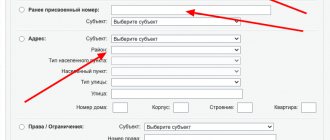The word “arrest” contains a lot of frightening things for an unprepared citizen. Seizure of property, including a car, is no exception. It would seem that it could be difficult - they seized the car, came and took away the car, which means it cannot be used, which means that such a vehicle cannot be sold, which means this is not a problem for anyone other than the owner.
However, the situation is much more complicated - in some cases the seized car will be taken to a special parking lot and even sold, while in others it can be used quite legally. Since there is a question about the seizure of the car, then we will look for the answer. But we warn you, it simply won’t work – you will have to turn to several codes and federal laws at once.
- Can a bank seize a car?
- When can you drive a seized car?
- How to find out who seized a car?
- Act and resolution on seizure
- Option 1. Pay off existing debt
What does it mean to seize a car?
For most inexperienced car owners, car seizure, ban or restriction of registration actions are identical concepts. However, from a legal point of view they are different.
The restriction prevents the implementation of ownership rights (or other rights) in relation to property. This measure can be used when dividing a car between spouses during a divorce, pledging a vehicle as collateral, etc.
A prohibition should be understood as a decision that prevents the owner of the property from performing a specific action or series of actions. For vehicles, a ban on registration actions is most often used. This measure can be used if there are debts on alimony, loans, fines and in other situations.
The concept of arrest is much broader than the previous ones. In accordance with Article 51 of the Federal Law “On Enforcement Proceedings” (FZ-229 of October 2, 2007), this measure provides for an inventory of property and a ban on performing absolutely any actions with it.
Also read: All about traffic police restrictions on cars
Checking the car by VIN code
You can find out whether a car has been seized online using the VIN code. This method allows you to quickly obtain information. You can check it on our website using a free service.
To obtain the information you are interested in about a car, you will need to indicate its VIN number in the form that opens. It is registered in PTS and STS and consists of 17 alphabetic and digital characters.
After entering the VIN code, you need to click the “Search” button and wait for the verification results. During the analysis, the system will provide the following information:
- about cars and owners;
- accident history;
- presence of arrests/bans on registration;
- the vehicle is in collateral;
- about using a car as a taxi.
The site interacts with official databases and guarantees the accuracy of the information provided.
Who has the right to seize a car and in what cases?
This procedure can be initiated by a decision:
- court when satisfying the claim of any organization or government agency (bank, social security department, etc.);
- customs authorities;
- bailiffs.
There are many reasons why a car is seized. The most common of them are unpaid utilities, overdue loans, debts for alimony or traffic police fines. Also, punitive sanctions can be initiated for non-payment of taxes or for violations of customs clearance of a car (for example, the owner, in order to avoid paying a fee to the state treasury, imports it from abroad for spare parts, etc.).
If you lose a civil lawsuit for collection
If your debt arose as a result of a claim against you by a third-party organization or individuals, then everything here is similar to traffic police fines, and the car can be taken away by bailiffs if the amount of debt is more than 3 thousand rubles.
The most common categories of debts for which FSSP cars are taken away:
- recourse claim from the insurance company under compulsory motor liability insurance (a particularly common case is when the culprit did not provide a copy of the European protocol),
- a claim for compensation for damage in an accident when the culprit does not have auto liability insurance, therefore, he himself is responsible for the damage.
Seizure procedure
The seizure of a car by bailiffs is carried out in the manner provided for in Articles 64 and 68 of the Federal Law “On Enforcement Proceedings”. FSSP employees are required to present the owner with the relevant resolution and draw up an inventory of the property.
An act of seizure must be drawn up and documents for the car must be confiscated: PTS and registration certificate (in this case, the presence of two witnesses is required). The act of seizure specifies the following parameters:
- car color;
- license plate;
- body and engine numbers (when it comes to trucks, the chassis number is additionally indicated).
In addition, the document must mention external and internal defects of the car.
Then the issue of transferring the vehicle for storage is decided. An outside person or organization with which the FSSP has concluded a corresponding agreement may be appointed responsible for the safety of the car. However, quite often the seizure procedure is not carried out. In this case, the owner of the car or one of his family members is appointed responsible for storage.
It should be remembered that using a seized car, in accordance with Art. 86 of the Federal Law “On Enforcement Proceedings”, it is impossible without the written consent of the bailiff. Otherwise, the matter may lead to criminal liability.
By the way, you most likely will not receive permission from the bailiff, since cars belong to the category of property that can suffer significant damage during operation (for example, in a traffic accident). Accordingly, the cost of the seized transport will decrease.
The lien on the car will be removed after the debt is paid off. Otherwise, it may be put up for auction.
When confiscation is not possible
Let's say you bought a car that was seized. The bailiff receives a decree to confiscate the vehicle to pay off the debt. In this case, it remains to find out whether you are on the list of exceptions when the car cannot be seized. This includes the following situations:
- this vehicle is the only means of earning money in the family;
- the car is used to move or transport a disabled person;
- the family or owner live in a remote area, from where it is impossible to get to the city by public transport.
If you did not know about the arrest, then this will not be accepted as a valid reason. The property will be confiscated despite your ignorance.
In what cases can the seizure of a car by bailiffs be challenged?
According to current legislation, the arrest procedure cannot be carried out if the car belongs to:
- one of the debtor’s family members (for example, the husband’s car should not be seized for the wife’s debts or vice versa);
- a disabled person, and he needs it for movement;
- a debtor whose work is directly related to the use of a car he owns (taxi, freight transportation, etc.).
If the owner of the vehicle fits one of the above categories, but the arrest was still made, it’s time to go to court.
What are the risks of buying a seized car?
Some owners, after a car has already been seized, try to get rid of it. And there are buyers for such vehicles: they are attracted by the relatively low cost. If you make such a transaction knowingly, remember that you will not be able to legally complete the purchase. All seized vehicles are included in the traffic police database.
Often, the buyer simply does not know that the car sold to him is under arrest. Having contacted the traffic police, the newly-minted owner is denied registration of the vehicle. That is, you seem to have a car, but he cannot use it legally.
In this situation, there are several options:
- Try to get punitive sanctions lifted. True, this is only possible in a situation where the seizure occurred later than the conclusion of the purchase and sale agreement for the vehicle.
- Try to negotiate peacefully with the seller to terminate the transaction and return the money by sending him a corresponding claim in writing. The effectiveness of such actions is very doubtful, since the owner of the car perfectly understood the illegality of his act, which means that persuasion most likely will not work on him. Often the seller simply hides, turns off the phone and does not want to get in touch.
- If the second option does not work, you will have to file a claim to terminate the transaction and return the funds. The buyer has every right to do this in accordance with Article 460 of the Civil Code of the Russian Federation. Here you need to remember the following: if the transaction amount is less than 50 thousand rubles. - you should contact the magistrates, if more - the district court.
Practice shows that in the vast majority of cases your claim will be satisfied, but be prepared for the fact that the legal proceedings will take about 2 months.
An important point when drawing up a purchase and sale agreement (SPA) is to indicate the actual cost of the car. Often, by mutual agreement, a much smaller amount is fixed on paper. At the same time, the buyer should understand that if, for example, he actually paid 500 thousand rubles for the purchase, and the contract indicates half that amount, it will be very difficult to return the money in full. After all, the court does not need words, but documented evidence.
A word from the experts
Yulia Kombarova, General Director of Legal Bureau No. 1:
“In all standard contracts for the purchase and sale of property, including cars, there is a clause that states: “The seller guarantees that the car is not pledged, that third parties have no claims to it, and the seller also guarantees that it has no signs of and bankruptcy cases filed.” This clause of the contract protects the buyer, and places full responsibility for the circumstances of the transaction on the seller. Therefore, in the event of detection of arrests imposed on the item of purchase, after concluding a sales contract and transferring money, the buyer has the right to invalidate the contract, receive the money back and return the car.
Proving the good faith of the acquirer is, of course, a time-consuming legal process. But for the services of a representative and other legal expenses can be recovered from an unscrupulous seller in court. It should be noted that if you win a lawsuit, you will not be able to get money right away. Most likely, you will have to contact the bailiff service, and if the debtor is in bankruptcy proceedings, then submit your claims to the register of creditors of the debtor in the bankruptcy case.”
Valerik Vardanovich Galstyan, senior partner of the law firm:
“In such a situation, things can develop in two ways:
- If the contract for the sale and purchase of a vehicle was executed before the seizure, then the new owner has the opportunity to try to lift the seizure in court by proving that he was a bona fide purchaser, and at the time of the seizure the vehicle was not owned by the seller.
- If the purchase and sale agreement was executed after the seizure, the car will be confiscated from the new owner, since the seizure is a restriction on taking actions to alienate property. Therefore, the seller did not have the right to sell the property under arrest.
In the second case, the new owner has every right to terminate the purchase and sale agreement concluded with the seller and demand the return of the funds paid by him.”
What to do if a car is your only source of income?
What actions will be taken if the debtor makes a living using a car? You can rest assured that they won’t be able to take your car away. This is reflected in the Code of Civil Procedure, Article 446. Another case when a vehicle cannot be confiscated is if it is driven by a disabled person.
Info
But there is one subtlety. The market price of a car should not be higher than 100 times the minimum wage; at the moment it averages 10,700 rubles, depending on the region. If it is less, then they will no longer be able to take it away. The amount is easy to calculate - it is about 1.1 million rubles.
Thus, FSSP employees do not have the right to just take the car. First, they must understand all the circumstances of the case and the debtor. To ensure that there is no violation of the current legislation of the Russian Federation.










